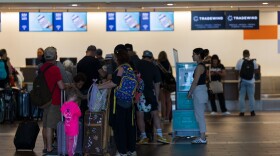Jessenia Martinez Ortega prioritizes serving her Latino community in her work as executive secretary to Mayor Connor Martin of East Hartford. She connects residents with resources, maintains smooth operations within the mayor’s office and coordinates communication between town departments. But she does more than that. As a Puerto Rican Spanish-speaker, she bridges the gap between the Latino community in East Hartford and local government to make sure her people are heard.
Martinez Ortega says her leadership is shaped by her resilience, which she says was forged through her upbringing with a mother who did not know how to access local resources. Her resilience is reinforced by her dedication to helping Latinos in her town, she says, and by encouraging other Latinas to find their seat at the table.
In the following Q&A, Jessenia Martinez Ortega, who is a graduate of the professional development program Latinas in Leadership Institute (LiLi), looks back on her journey to becoming executive secretary, overcoming self-doubt and the community impact she’s made. She says that journey has given her the confidence to call herself a leader and to have the ambition to seek out new leadership roles in the future.
Q: Can you tell us about your upbringing, what people, places, or values shape you?
A: I grew up watching my mom raise four daughters on her own, so that's where I get my resilience from and my acts of service, just watching her struggle quietly and never showing us what she was really going through. It became clear when I grew up to be a mother myself, what she was really going through, and knowing that there were resources out there, and she just didn't know how to even reach out.
My mom was always very open with most [things] except her struggles. When I grew up, [I had] a conversation with her where I said, ‘Mom, why did you allow this to happen?’ For example, she would feed us, and I started noticing she wasn't eating, and it's because we didn't have enough food, right? We would eat the same thing over and over. I was like, ‘Mom, why didn't you just go to the town or DSS (CT Department of Social Services)?’ She was like, ‘No one would help me. There was always a no as an answer.’
Q: Growing up, what Latinas did you see in leadership roles? How did you start imagining yourself in one?
A: Looking back, it would have helped having mentors. Not only for Latinas, but for all young women, it's very important. I think I started late because of that. I would have started earlier in my career as a leader. I think I would have been way ahead of where I'm at today. I knew there was something out there for me, I just didn't know what.
It took a manager of mine in the past to see something, sit me down and say, ‘You have leadership skills. You just don't know it yet.’ And that's when it hit me. I was like, ‘You're right. I do.’ It took some time [because] I'm always doubting myself, but he kept giving me tasks that others couldn't complete and would trust me with it. He promoted me as an office manager, and I kept completing tasks, but in the back of my mind I was like, ‘This isn't for me. I shouldn't be in this seat.’ But I knew what I was doing, and I just wanted more.
I know that I should be at the table. That's the only way we will see change. And that's something I hardly ever saw: a Latina at a table with leaders. So I knew I needed to be the one. I was going to go for it.
Q: Tell me the story of how you got to the position that you're in today.
A: Prior to the mayor's office, I worked at East Hartford Housing Authority. I worked as the admin, so the front desk, and a lot of the housing residents would come in and say, ‘This is the only help I have. I have nowhere to go.’ I would tell them, ‘There is a local government, won't you go to city hall and pay them a visit? Visit the mayor's office if you're not happy.’ And they would always say, ‘They don't speak Spanish.’

So I came across a job posting on social media from the previous mayor, Mayor Walsh, who I look up to, a great person. He was looking for an executive secretary. Of course, doubt came first. I looked at the posting for about two days. It was three o'clock in the morning when I applied. I said, ‘Let me just apply. I want to bridge the gap. I want to be the one.’ He called me a week later. When he interviewed me, I said, ‘You need someone who speaks Spanish. You have a large population of Spanish speaking residents, and I'm the one.’
I'm gonna be brutally honest with you. I interviewed, I accepted the position, right there and then, and then, a week later, I declined the offer. I said, ‘I'm not good enough.’ I just doubted myself at that moment. Two months later, I regretted my decision, and Mayor Walsh called me one night from his house number. I remember it so clearly. It was 8:02 p.m. I answered the call, and it was Mayor Walsh, and he said, ‘Jesse, I need you on my team. I can't stop thinking about you, your skills and the change you can make. Please, think about it.’ And that meant everything.
So I got hired, and from there on, residents from the Housing Authority visited the mayor's office, and they were shocked. ‘Wait, you're Jesse from Housing. I'm so happy you're here. I know we're going to get help.’ So, you know, it paid off. It was more not for myself, it was for others, to help others. Because I remember my mom not being able to know where to go and find resources, and that always pushed me.
Q: If we talked again in 10 years, what would you hope to be celebrating?
Be an elected official? I think right now I'm okay where I'm at. I think I can make an impact in my position, but
I would love to be an elected official, probably in a board of education for the state.
I can't say run for mayor. Not yet. I won't rule anything out but an elected official.
Q: Has there been a moment that reinforced for you that this is the work you wanted to be doing?
A: I am a mother of two. I have a beautiful almost 22 year old. She'll be 22 in December, my world. And I have the most amazing little boy. He's 12, and she would always say, ‘That's your favorite child.’ But she is my everything. And when I took this job, it took a few months for them to realize what I did. They weren't familiar with the government. So, it reassured me I'm doing the right thing when my daughter looked at me once and she goes, ‘Mom, I'm so proud of you. I never thought that you'd be in an office like that.’ For me, I want to make sure that my daughter doesn't face the challenges that I faced growing up. So now I can teach her. This is what's out there. You're not alone. If I'm ever not around, reach out. There's always something out there for you.
Recently, I've joined the Latina Leadership Institute, and when I told my mom, I was like, I got accepted, and I was super happy, she's like, ‘What is that for?’ We had a moment where I was teaching her, and she just sat there looking at me, like, ‘How do you know so much?’ I was like, ‘Mom, I wanted to know more. I didn't want to stay stuck.’ We had a very honest conversation at that point. She goes, ‘Why is it so important for you to be a leader?’ And I said, ‘My daughter, and that generation.’ We need more. We need more, and we want changes.
Q: What makes our Latino communities strong?
A: We don't stop. We know we want changes, and a lot of us work hard for it. We just don't stay stuck in the system. I think now, it's a bigger conversation, where before it was something closed off. Now it's like, ‘Okay, we have to be part of the change.’
We're just unstoppable. We are. I get emotional because I know we're just amazing people. A lot of people don't see us as leaders, but we are.

Q: What advice would you give young Latinas in finding their purpose?
A: Don't ask for permission. Be yourself, even when you walk in a room that no one else looks like you. Walk in with your head high. Also, surround yourself with people who are motivated to make changes, to be better. Find a mentor and be a mentor. You find your purpose when you surround yourself with positive individuals and also be a positive individual for others.
This story is part of the series Poderosas: Portraits of Purpose, highlighting Latina leaders in our Connecticut communities.





